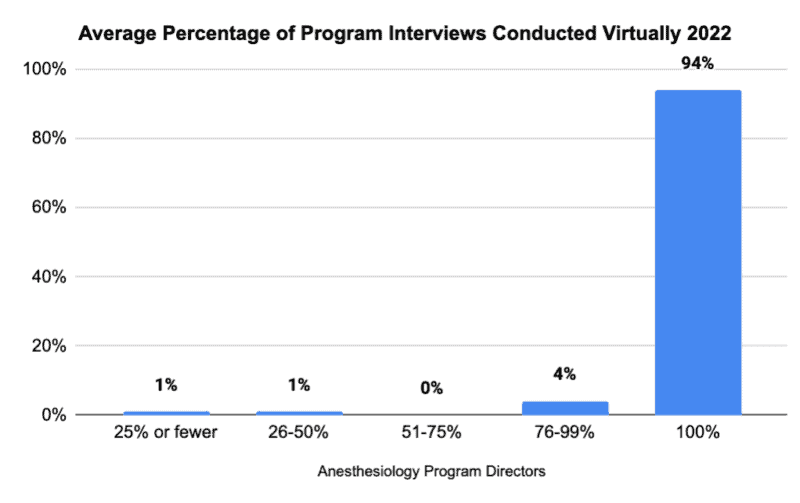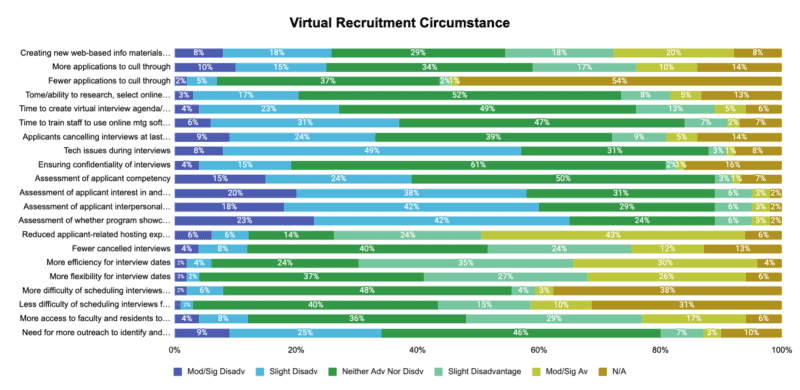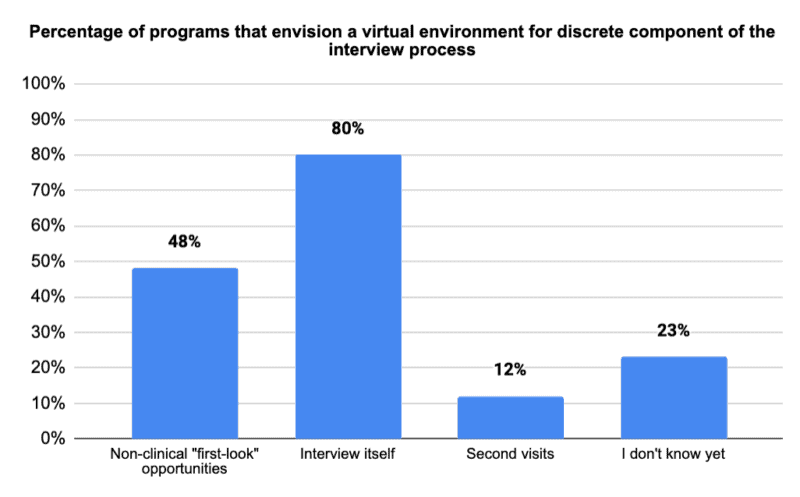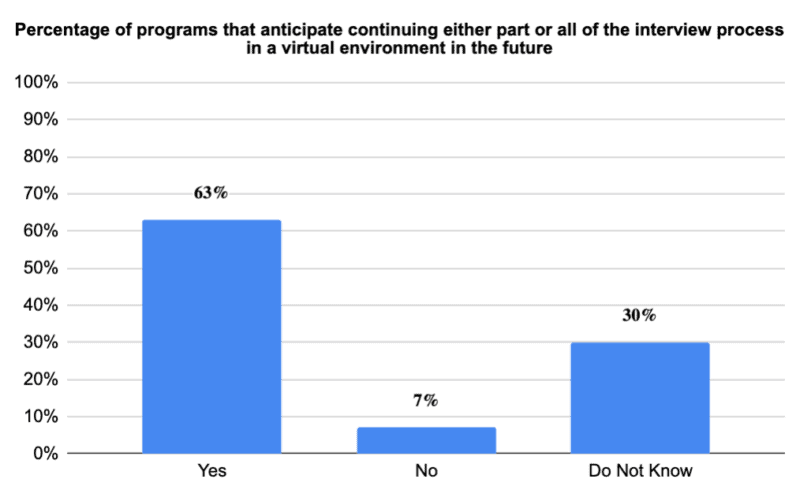
Due to Covid, travel restrictions caused most residency program interviews to be done virtually from 2020 to 2022. Is this a trend that will continue in 2023 and beyond? Are there any advantages – or disadvantages – that you should be aware of and prepare for? What do program directors think of virtual interviews (VIs)? And how should you prepare for possible VIs in the future?
In this article, we will walk you through the advantages and challenges faced by applicants and programs during the virtual interviews adopted during Covid 19.
Summary:
- A majority of programs relied on virtual interviews with 94% of programs reporting that 100% of interviews were virtual.
- Program directors reported the main advantages of virtual interviews are better efficiency and flexibility and lower hosting expenses.
- The main disadvantages include tech issues, assessment of candidates’ interest in the program and interpersonal skills, and whether the program was showcased adequately.
- A majority of programs (64%) expect some component of the interview process to be virtual in the future, while only 4% of programs expect to have no virtual component.
- Demonstrating your interpersonal skills and interest beforehand in virtual rotations, and making preparations beforehand in case of technical issues can help avoid some disadvantages of VIs
Did Programs Rely on Virtuals Interviews in the 2022 Match?
Program directors were surveyed on their use VI’s in 2022. Below we can see that programs relied heavily on VIs with 94% of programs conducting 100% of interviews virtually in 2022. Only 1% of programs conducted <25% virtually.
It’s important to keep in mind that during Covid-19, lockdowns and hospital policies made it impossible (or at least difficult) to conduct interviews in person. Therefore, these numbers may be artificially skewed towards programs using VIs, so they may not reflect the preference of the individual programs.
To get a better idea of future intentions, let’s look at the advantages and disadvantages of VIs according to PDs.
What do Programs Directors Like (or Dislike) About Virtual Interviews?
The majority of PDs agreed that virtual interviews were less expensive for programs where in-person interviews require travel (which AAMC calculates to be in the range of $600-$2400).
As we’ve written before, interpersonal skills and interactions with faculty, staff, and residents are important factors for ranking applicants and can make all the difference during your interview. This is reflected in the 2022 data, where PDs reported the main disadvantage of VIs was assessing applicants’ interpersonal skills, professionalism, and fit for the program.
Here you will see the % of perceived advantages and disadvantages of virtual interviews as responded to by program directors.
Advantages (where >50% of respondents found slight to significant advantages) included:
- More efficiency of the interview process
- More flexibility in interview dates
- Reduced applicant-related hosting expenses
Disadvantages (where>50% of respondents found slight to significant disadvantages) included:
- Tech issues during interviews
- Assessment of applicant interest in and understanding of the program
- Assessment of applicant interpersonal skills, alignment with the interview team
- Assessment of whether the program showcased adequately
Here is the same data presented in a table:
| Perceived Advantages/Disadvantages of Virtual Recruitment 2022 | Mod/Sig Disadvantage | Slight Disadvantage | Neither Advantage Nor Disadvantage | Slight Advantage | Mod/Sig Advantage | N/A |
|---|---|---|---|---|---|---|
| Creating new web-based info materials about program | 8% | 18% | 29% | 18% | 20% | 8% |
| More applications to cull through | 10% | 15% | 34% | 17% | 10% | 14% |
| Fewer applications to cull through | 2% | 5% | 37% | 2% | 1% | 54% |
| Tome/ability to research, select online mtg platform | 3% | 17% | 52% | 8% | 5% | 13% |
| Time to create virtual interview agenda/itinerary | 4% | 23% | 49% | 13% | 5% | 6% |
| Time to train staff to use online mtg software | 6% | 31% | 47% | 7% | 2% | 7% |
| Applicants cancelling interviews at last minute | 9% | 24% | 39% | 9% | 5% | 14% |
| Tech issues during interviews | 8% | 49% | 31% | 3% | 1% | 8% |
| Ensuring confidentiality of interviews | 4% | 15% | 61% | 2% | 1% | 16% |
| Assessment of applicant competency | 15% | 24% | 50% | 3% | 1% | 7% |
| Assessment of applicant interest in and understanding of program | 20% | 38% | 31% | 6% | 3% | 2% |
| Assessment of applicant interpersonal skills, alignment with interview team | 18% | 42% | 29% | 6% | 3% | 2% |
| Assessment of whether program showcased adequately | 23% | 42% | 24% | 6% | 3% | 2% |
| Reduced applicant-related hosting expenses | 6% | 6% | 14% | 24% | 43% | 6% |
| Fewer cancelled interviews | 4% | 8% | 40% | 24% | 12% | 13% |
| More efficiency for interview dates | 2% | 4% | 24% | 35% | 30% | 4% |
| More flexibility for interview dates | 2% | 2% | 37% | 27% | 26% | 6% |
| More difficulty of scheduling interviews for applicants outside U.S. | 2% | 6% | 48% | 4% | 3% | 38% |
| Less difficulty of scheduling interviews for applicants outside U.S. | 1% | 2% | 40% | 15% | 10% | 31% |
| More access to faculty and residents to participate in interview process | 4% | 8% | 36% | 29% | 17% | 6% |
| Need for more outreach to identify and capture interested applicants | 9% | 25% | 46% | 7% | 3% | 10% |
Will Interviews be Virtual in 2023?
According to the NRMP Program Director Survey, 80% of programs anticipate continuing to use VIs for the interview itself, while only 12% anticipate using VIs for second visits. Approximately 23% of programs have not yet decided if any part of the interview process will be virtual.
In the future, how likely is it that some or all of the interview process will be conducted virtually?
The results of the NRMP Program Director’s survey is suggesting a “yes”, where 63% of programs expect their willingness to depend on VI for either part or all of the interview process. Despite the challenges posed by VI in the subjective assessment of applicants, only 7% of programs reported that they won’t rely on VI in the future. That said, 30% of programs are not yet decided on the use of VIs to in-person interviews.
What Should Applicants Do to Minimize the Disadvantages of VIs?
Assessing the interest and understanding of the applicant in the program, as well as applicants’ interpersonal skills, are major disadvantages reported by PDs. To overcome this challenge, applicants should consider other methods of connecting remotely with their desired programs.
Various medical institutions have begun offering virtual rotations instead of traditional away rotations. These rotations allow students to meet virtually and communicate directly with residents and faculty in their desired program before the official interview. This can help students express their interest before the official interview day and also give them more opportunities to demonstrate their interpersonal skills.
Various technical issues may also impact your VI, so it’s important to take steps to prepare. In some cases, tech issues may be out of your hands, but you should try to avoid any issues on your side. The following are measures that help minimize the occurrence of technical issues:
- Use the meeting software beforehand to test your camera and audio
- Join the interview session at least 10 minutes early to resolve any technical difficulty
- Have the contact information of the program coordinator in case of unexpected technical difficulties during the interview
Concluding Thoughts
When compared to in-person interviews, virtual interviews offer several advantages. These include increased flexibility, saving time, and allowing candidates to attend multiple interviews without the impediment of travel time. However, to determine the value of these advantages, it is necessary to weigh them against their disadvantages, mainly assessing how well an applicant fits into the program.











